Influential Insider In Iran Warns Against Involvement In Gaza War
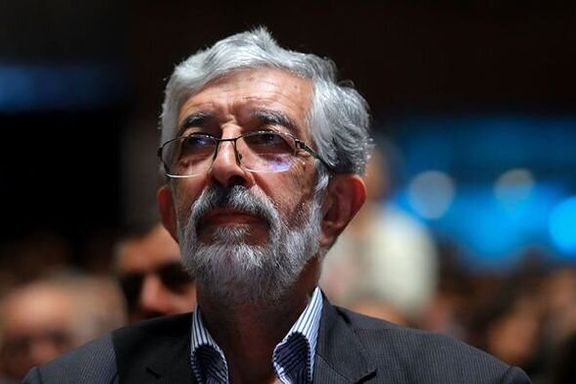
Former Iranian Parliament Speaker Gholam Ali Haddad Adel, a figure close to Iran's ruler Ali Khamenei, has cautioned against Iran's participation in the Gaza war.

Former Iranian Parliament Speaker Gholam Ali Haddad Adel, a figure close to Iran's ruler Ali Khamenei, has cautioned against Iran's participation in the Gaza war.
In a TV interview on Friday, the close relative of Supreme Leader Ali Khamenei stated that “Israel aims to transform the Gaza conflict into a war between Iran and the United States.”
The Expediency Council also warned that if such a scenario unfolds, the primary beneficiary of a secure existence would be the "Zionist regime”, the term used to refer to the Jewish state now at war with Iran-backed Hamas.
The proscribed terror group invaded Israel on October 7 and the US immediately backed the country’s right to defend itself in the wake of an attack which was the single most deadly day for Jews since the Holocaust.
His warning aligns with the recent sentiments expressed by former President Hassan Rouhani, who cautioned against Iran getting entangled in the Israel-Hamas conflict in Gaza. Rouhani highlighted the risk Iran faces due to its role in fueling the conflict and underscored the potential consequences of direct or indirect involvement, stating that “a wrong decision could draw the flames of war towards Iran.”
Former Foreign Minister Mohammad Javad Zarif also weighed in, stating that if Iran is dragged into the Israel-Gaza war, the consequences would fall on the people, not the state officials.
The conflict has resulted in the most severe escalation in the Gaza Strip since Hamas took control in 2007. Iran's proxies in Syria, Lebanon, Iraq, and Yemen have become involved, despite Tehran's continued denials of direct involvement.
The United States has strongly supported its ally Israel, mobilizing warships and troops in response to the attack. As a result, the alliance has also since led to US facilities in Syria and Iraq coming under fire from Iran's proxies in dozens of attacks.
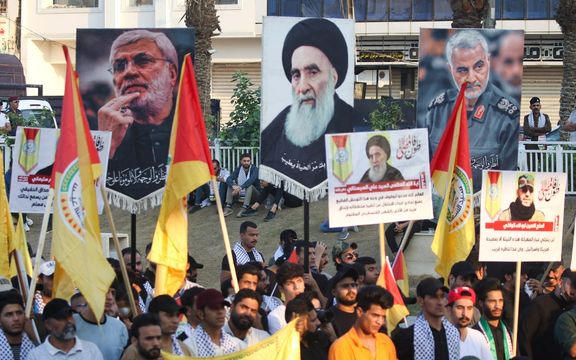
Washington sanctioned an Iran-backed militia group in Iraq on Friday for targeting US troops, after it approved the release of billions of dollars to Iran this week.
The US Treasury on Friday named six people that have been sanctioned because of their affiliation with Kata’ib Hezbollah., which itself has been added to the US terror list. Among those targeted is a member of the IRGC Quds Force, who the administration says facilitates travel and training of Kata’ib Hezbollah fighters in Iran.
"Today’s action sends a message to Kata’ib Hizballah and all other Iran-backed groups that the United States will use all available measures to hold to account any opportunistic actors who seek to exploit the situation in Gaza for their own ends," a Treasury official said.
Iran proxies have been attacking US forces ever since Israel invaded Gaza in retaliation for the October 7 Hamas terror attack.
On Friday, a Pentagon official told Iran International that multiple one-way drones had been launched against US positions in Syria and Iraq, bringing the number of such attacks to 62 in 31 days.
It’s not clear if the newly introduced sanctions can have a meaningful impact on the dynamics on the ground. The regime in Iran and its proxies have been dealing with various forms of sanctions for a long time.
The sanctions will freeze assets of the sanctioned individuals and entities in the US and generally bar Americans from dealing with them. But this will hardly deter the militia if they have little or no material relation or connection with the US.
The Biden administration seems to be reluctant to widen or deepen the conflict. Despite all the tough talk from Biden and his team, the American military has only launched a few airstrikes on IRGC-affiliated positions in Syria and Iraq to deter their daily attacks.
Biden critics say his leniency in dealing with Iran is at least partly to blame for the current situation by emboldening Tehran to advance its regional agenda with relative impunity.
"President Biden’s failure to respond to attacks by Iran and its proxies has put American troops in danger, said Senator Tom Cotton Tuesday. “We have to make Iran once again fear us before more Americans die.”
In the past few weeks, the US has deployed warships and air defense systems to the region, amid concerns that Israel’s onslaught of Gaza could trigger other groups such as Hezbollah in Lebanon to officially enter the scene, putting the whole region ablaze and endangering American troops stationed across the Middle East.
According to Reuters, the US military is taking new measures “to protect its Middle East forces during the ramp-up in attacks by suspected Iran-backed groups” and is leaving open “the possibility of evacuating military families if needed.”
The United States has 900 troops in Syria, and 2,500 more in neighboring Iraq.
On Thursday, Senators Lindsey Graham and Richard Blumenthal introduced legislation that urges Biden to attack Iran in case an American soldier was killed in Syria or Iraq.
“If an American is killed… then the target should be in Iran,” said Senator Graham in the press briefing for the initiative. “They need to pay a price they haven’t paid yet. That price should be the IRGC infrastructure… and the oil refineries.”
Many US lawmakers, including some within Biden’s Democratic Party, have become more critical of the administration due to what they see as letting the Iranian regime off the hook and refilling its coffers.
“Pres. Biden and his team decided early on that, if they were just nice to Iran, Iran would be nicer to us. As a result of that, Iran has been able to earn billions more from oil and got $4.5B in money via the IMF,” said Senator John Kennedy in an interview Friday.
The administration’s decision earlier this week to grant another sanction waiver to enable Iraq to pay Iran for electricity has enraged many lawmakers.
“Make no mistake,” Rep. John James wrote in a post on X, “the money we're allowing Iran to have will go toward killing Americans and Jews, and Biden is allowing it to happen with his ignorance, naivety, and complete lack of understanding of how global politics works. We must hold them accountable.”
The administration says that the Iranian government will not receive in hard currency in cash and can only purchase non-sanctionable goods with the funds that will be kept in Oman. However, critics say that if Tehran can import food and medicine with the funds, it can allocate it own dollars and euros from oil exports to destructive activities.

A senior official from the US National Security Agency (NSA) has said that alongside the Gaza war, Israel has faces cyber-attacks and disinformation from Iran and others.
Rob Joyce, the head of the Cybersecurity Directorate at the NSA, emphasized the pressure of these events, but also stated that most of them do not constitute major attacks and do not have a significant impact.
According to him, some of the attacks are carried out using the "Wiper" method, while others involve ransomware attacks, which have occurred in the past as well.
In recent days, the Israeli National Cyber Directorate issued a statement warning about the presence of an Iranian malware called "Wiper" in the country's internet infrastructure.
According to this senior official from the National Security Agency, Israel is currently concerned about three different threat groups in the cyber domain, with the Islamic Republic being at the forefront.
Due to the close relationship between the Islamic Republic and Hamas, the leaders of the United States' national security have warned about Iran's involvement in this conflict, citing its cyber capabilities and the current tensions.
Israel and Iran have a long history of cyber operations against one another, with Israel scoring successes in sabotage by cyber warfare against Iran’s nuclear program and other sensitive targets.
Recently, Christopher Wray, the director of the FBI, emphasized that if the current conflict in Gaza escalates, there may be an increased threat to the vital infrastructure of the United States by Iran and other cyber groups.
Rob Joyce identified "hacktivist" groups as the second threat against Israel. These hacker groups are often independent and have political and social objectives.
In the current battle in Israel, it is difficult to determine the affiliation of hacktivists to the warring governments.
The last threat refers to ransomware groups. These cyber criminals have considered the current conflict, which has created tensions and divisions in the world, as an opportune time for exploitation.
The head of the Cybersecurity Directorate at the National Security Agency emphasized that Israel's ongoing battle has led the country to improve its cyber defense capabilities.
According to him, Israeli institutions have established appropriate structures and processes to protect their vital infrastructure from attackers.
Rob Joyce noted that currently, most of the destructive activity against Israel comes from the Islamic Republic of Iran and hacktivist groups.
He refrained from commenting on the possible role of Russia in the current cyber threat situation.
The head of the Cybersecurity Directorate emphasized that the dissemination of false information and disinformation campaigns have likely had the greatest impact on the current conflicts.
It was reported in October that a hacking group with ties to Iran, known as the Crambus espionage group, executed an extensive intrusion into the computer systems of a Middle Eastern government.
The espionage group’s intrusion spanned an eight-month period from February to September 2023. The cyber attackers employed a range of tactics during the operation, including the theft of sensitive files and passwords, Symantec revealed.
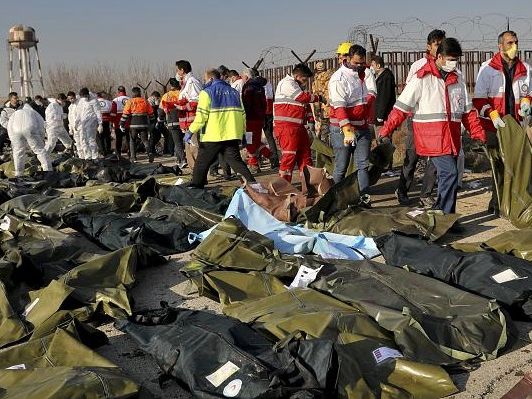
The families of the victims of Flight PS752 which was shut down by the Islamic Revolutionary Guards Corps (IRGC) in January 2020 have demanded justice for those killed by security forces in 2019.
On the anniversary of the November 2019 protests, the association expressed their wish for "the presence of independent and impartial trials in Iran to hold accountable those responsible for the bloody November events."
On Thursday, the association, referring to the killings of over 1,500 people during the protests four years ago, said in a statement that they are "in search of truth and justice" for the victims of these protests.
The exact number of casualties from these crackdowns is not clear, but Reuters, citing "three sources close to Iran’s ruler “Ali Khamenei's circle" and a "fourth official," reported that the Supreme Leader had told senior officials, "Do whatever is necessary to stop" the protests, while also stating that at least 1,500 people were killed during the unrest.
In their statement on Thursday, the Flight PS752 Families Association announced that the burial of the victims of these protests was held under "extraordinary conditions and intense security pressure," stating: "The mourning of many families in November turned into a widespread struggle for justice." The association was formed after a civilian airliner was shot down over Tehran killing 176 people onboard.
The association also mentioned in their statement that some families seeking justice for the victims of the November 2019 protests “are still imprisoned for no reason."
Reports indicate that the families of those killed in the November 2019 gathered at the gravesites of the slain protesters in the cities of Karaj, Rasht, Isfahan, Sanandaj, Qazvin, Tabriz, Mahabad, Langroud, Fouman, and other cities in Iran.
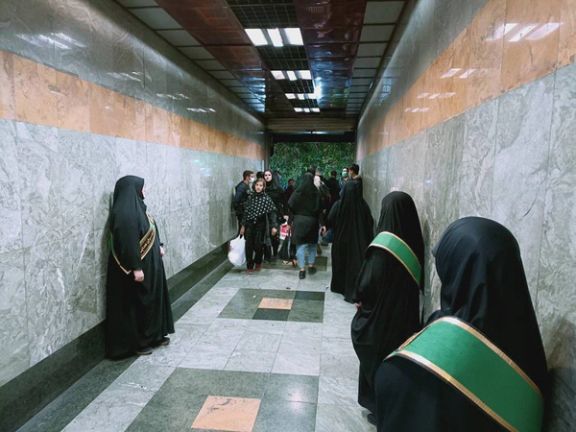
Iranian news websites and social media users report that officers have been deployed in greater numbers and armed with cameras to enforce mandatory hijab in the Tehran’s metro stations.
Numerous hijab officers can be seen crowded into a subway passageway in Tehran's Enghelab station, according to social media images posted Friday. The situation has been described as the "horror tunnel" for women.
The Tehran newspaper Farhikhtegan verified the increased presence of hijab enforcers on Thursday in other busy metro stations.
The newspaper highlighted that the Security Police (FARAJA) was assisting the hijab enforcers by using their cameras to spot and identify women without headscarves.
“There is an increase of FARAJA forces in the subway stations, especially in front of the ticket gates and next to the hijab guards, and when you leave the gate, a young man with a small camera will appear in front of you to take your picture,” Farhikhtegan wrote.
Over the past week, reports on social media have increased about the government's more aggressive attempts to impose and monitor hijab in the subway.
"Recording images of passersby violates people's right to privacy," added Farhikhtegan in its article.
The hijab officers in the subways have become extremely strict after Iranian-Kurdish woman Mahsa Amini, 22, died in hijab police custody in September 2022, sparking the "Women, Life, Freedom" protests.
In May, Tehran mayor Alireza Zakani announced that the city has implemented a uniformed security unit to prevent women from entering the metro ticket gates unveiled.
There was also a report in August that Tehran municipality would send 400 personnel to enforce hijab laws at subway stations in the capital.
The increased presence of hijab police also evokes the memory of Armita Geravand, 16, who in October died after an encounter with Tehran's hijab police.
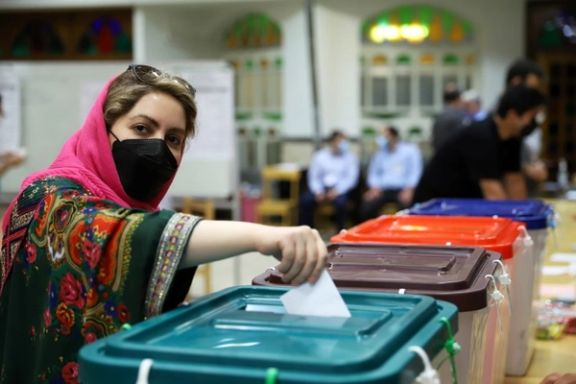
Concerns are growing over extremely low turnout in Iran’s March elections after the government barred many candidates including over a dozen sitting lawmakers.
Interior Minister Ahmad Vahidi on Wednesday claimed that the government of President Ebrahim Raisi had no role in disqualifying candidates, but contradicting himself he added “except in the case of the sitting lawmakers who have been disqualified”. He insisted that the disqualifications had nothing to do with these lawmakers’ criticism of the government.
Some of the affected candidates have complained that their disqualification was arbitrary and blamed ultra-hardliners who have strong influence in President Ebrahim Raisi’s administration and his interior ministry for “filtering” those who have registered.
Elections during the Islamic Republic have never been democratic for many reasons, but particularly for the fact that only candidates who agree with the principle of a religious state and clerical rule were allowed to run. However, increasingly requirements have become tighter, and only those loyal to hardliners have been able to compete.
The ministry’s executive boards conduct an initial screening -- based on information provided by the ministry of intelligence, the judiciary, police, and the National Organization for Civil Registration -- before major ideological vetting by the Constitutional watchdog, the Guardian Council.
Most reformist parties and groups, as well as many among moderate conservatives, have not shown any interest in the elections given extensive vetting in 2020 elections which excluded them from the parliament and resulted in domination by ultra-hardliners.
The public has also been so indifferent that some regime insiders say turnout may be as low as 15 percent. The parliamentary elections are scheduled for March 1, and despite worsening economic conditions and 50 percent annual inflation, the public does not see a chance of any improvement. They believe that the same elites committed to Supreme Leader Ali Khamenei’s policies will cruise to victory.
In a rare political commentary Tuesday, Nour News, a news website affiliated to the Supreme National Security Council (SNSC), warned about extreme lack of public interest in the elections and the negative role played by a “certain political group”, presumably the ultra-hardliner Paydari Front, to it.
The Paydari Front who have gained huge influence in Raisi’s government are believed to be behind a “political purification plan” that aims to purge all loyalists outside their own group from positions of power.
The Nour News commentary said disqualification of candidates by the interior ministry’s executive boards did not indicate a “flexible and open-minded approach” on their part which can contribute to a drop in voter turnout, while stressing the importance of high participation in boosting the legitimacy of the Islamic Republic.
Any behavior or approach that increases “the rate of real participation of citizens” in the elections will boost the regime’s legitimacy and its national authority while any step taken in the opposite direction will weaken it, Nour News, wrote.
Admitting that there is no marked interest in the upcoming elections yet, Nour News said the supremacy of those who oppose participation in the elections over those who promote high participation is “a worrying fact that cannot be ignored.”
Ultra-hardliners of the Paydari Front blamed former national security chief Ali Shamkhani for not crushing last year’s protests in the bud and even accused him of complicity with former reformist President Mohammad Khatami under whom he served as defense minister between 1997 and 2005.
Voter turnout in the 2020 parliamentary elections officially dropped to 42.57%, the lowest since the first elections held in 1979, only two months after the Islamic Revolution, in which 52.14 percent of those eligible to vote had taken part. Some critics say that even the official turnout numbers are exaggerated, and far fewer people cast ballots.
The Guardian Council disqualified even those reformist candidates who were closer to conservatives than to most other reformists, ensuring that many seats went to ultraconservatives and hardliners without any challenge from reformist rivals.
The highest participation rate was registered in 2001, during the presidency of the reformist Mohammad Khatami, when 67 percent of eligible voters went to the polls. This was one of the rare occasions when the Guardian Council allowed candidates from across the political spectrum to run. Reformists gained an overwhelming majority in the 2001 elections.